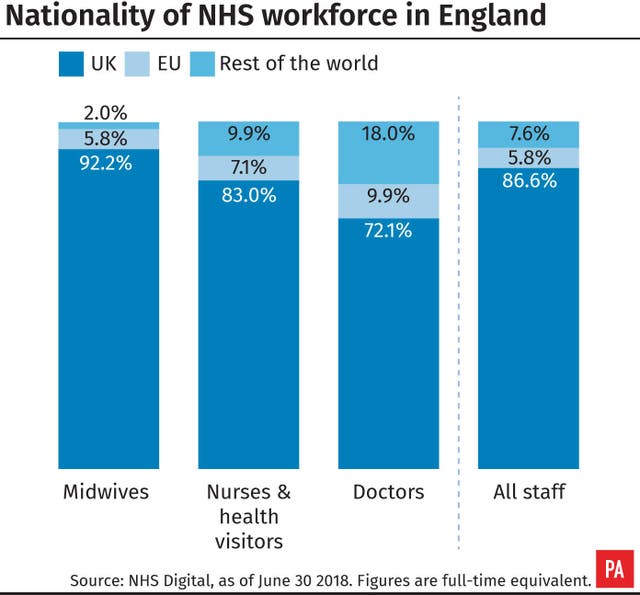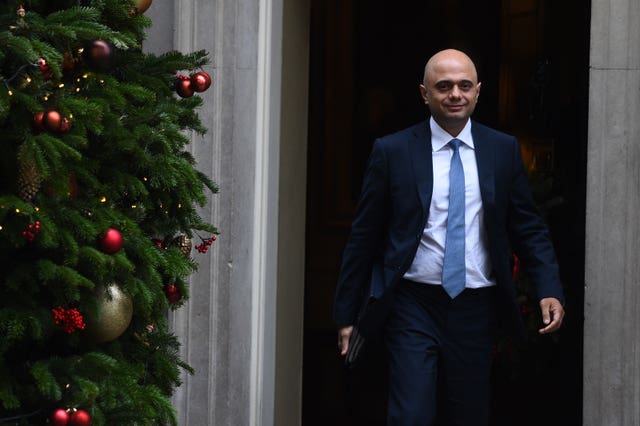
The Government will get immigration down to “sustainable” levels, but there will be no “specific target” for reducing the numbers, Home Secretary Sajid Javid has said.
Mr Javid is publishing a long-awaited white paper setting out the Government’s plans for a post-Brexit immigration system, ending freedom of movement.
Under the blueprint, there will be a new visa route for skilled workers and no cap on high-skilled professions such as doctors and engineers.

Interviewed on the BBC Radio 4 Today programme, Mr Javid denied the Government was abandoning commitments in the Conservative Party general election manifesto to cut immigration.
However, he refused several times to repeat the target first set by David Cameron to get annual net migration down below 100,000 – a target which the Government has consistently failed to meet.
“There is no specific target. It will be a system that will bring net migration down to more sustainable levels,” Mr Javid said.
“If you look at the current level of migration, the latest stats show 273,000. Most people agree that is very high, certainly by historical standards.

“In the last two decades it has been in the hundreds of thousands. If you go back further than that it was much lower.
“What we want to do is bring it to a level where it is sustainable in the sense that it meets first our economic need and at the same time though it is not too high a burden on our communities or on our infrastructure.”
Mr Javid confirmed the Government intended to set a minimum salary requirement for higher-skilled workers applying for five-year visas.
However, after the independent Migration Advisory Committee (MAC) recommended a £30,000 threshold, he said they would be consulting further on what the level should be.
“We are not setting the exact threshold today. There will be a threshold. The MAC suggested it should be £30,000,” he said.
“That is their view and it is based on their evidence and it is very important for us to listen to that. It is equally important to listen to business to find the right threshold.
“We will consult further on whether it is £30,000 or thereabouts. What is important is that it is the principle that the MAC set out, which is absolutely right, where we want to focus on high skills.”
The decision to consult further follows a bitter Cabinet battle over what the threshold should be amid warnings from employers that they will struggle to recruit staff they need if it is set too high.
Saffron Cordery, deputy chief executive of NHS Providers representing NHS trusts, said the organisation was “deeply concerned” about the impact on the health services.
“High skills does not equal high pay,” she told the Today programme.
“You have got starting salaries for nurses at £23,000 – also for paramedics, midwives. Junior doctors’ starting salaries at £27,000, healthcare assistants at £17,000, all coming in way below that £30,000 cap.
“It is not just health workers, it is social care as well. We have to remember where the skills lay. They lay in those staff under £30,000.”
Mr Javid said while the UK would remain an “open, welcoming country” to migrants, the proposals would deliver on one of the “key messages” from the 2016 EU referendum vote.
“We are delivering on the clear instruction to get control over our borders and will bring in a new system that works in the interest of the British people,” he said.
“It will be a single, skills-based immigration system built around the talent and expertise people can bring, rather than where they come from – maximising the benefits of immigration and demonstrating the UK is open for business.”
The new immigration and borders system will be implemented in a “phased” approach from 2021, following the post-exit transition period.
On Thursday, an Immigration and Social Security Coordination (EU Withdrawal) Bill will be presented in the House of Commons.
As well as measures to end free movement, it creates the legal framework for a future, single benefits system that will apply to EU and non-EU nationals.
The white paper was initially due to be published more than a year ago, but it was held back while the MAC carried out a detailed analysis.
The MAC’s report, published in September, concluded that the new system should make it easier for higher-skilled workers to come to the country.
It recommended ministers scrap an annual cap of 20,700 on the number of visas available under the Tier 2 skilled work scheme, and open up the route to “medium-skilled” jobs.
But it said access to Britain’s jobs market should be restricted for lower-skilled migrants.


Comments: Our rules
We want our comments to be a lively and valuable part of our community - a place where readers can debate and engage with the most important local issues. The ability to comment on our stories is a privilege, not a right, however, and that privilege may be withdrawn if it is abused or misused.
Please report any comments that break our rules.
Read the rules hereLast Updated:
Report this comment Cancel